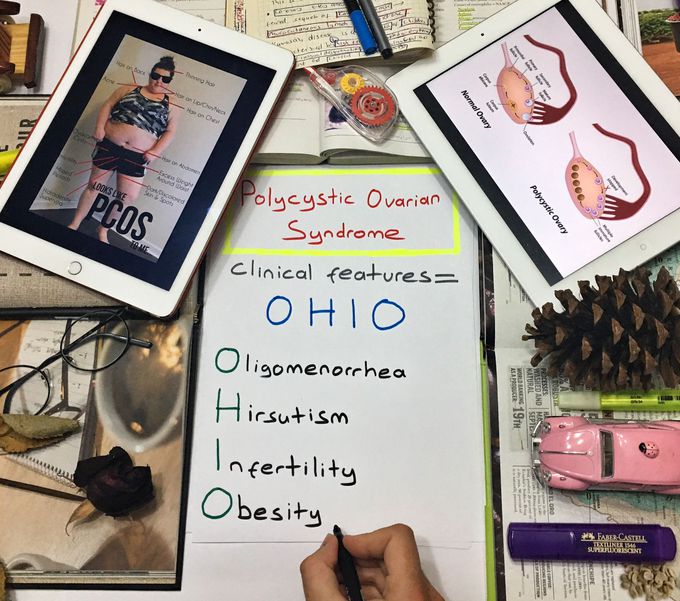


Pcos Mnemonic
Features Of PCOS = 👉Polycystic ovary syndrome (PCOS) is an inherited disease that affects women of childbearing age. The disorder causes multiple abnormal cysts in enlarged ovaries, so that they do not produce the normal number of eggs and do not ovulate (release eggs) normally. The disease is present at birth but does not cause symptoms until women enter puberty. PCOS occurs in up to 10% of women and is a leading cause of female infertility. Women with PCOS have irregular and infrequent menstrual periods and may develop amenorrhea (complete absence of menstrual periods). Women with PCOS are likely to have high blood pressure, obesity (especially central obesity, around the midsection of the abdomen), facial acne, hirsutism (excessive facial and body hair growth), and thinning scalp hair. They also have insulin resistance, which may lead to development of type 2 diabetes. 👉Treatment Treatment of PCOS focuses on the symptoms that occur in each individual. Risk reduction for diabetes and heart disease is important. A number of treatments are available: Weight loss and exercise can help to manage diabetes and high blood pressure and reduce risk of development of cardiovascular disease and stroke. Weight loss and exercise are also crucial to prevent type 2 diabetes. Medications may be prescribed to control blood pressure. Stopping smoking reduces risk of cardiac disease. Treating type 2 diabetes may involve oral medications and insulin if diet and exercise do not control elevated blood sugar levels. Oral contraceptives (birth control pills) regulate menstrual periods and suppress androgen (the hormone that causes excess body and facial hair growth in women). Metformin, an oral medication often used in treating type 2 diabetes, improves insulin resistance even if diabetes is not yet present, decreases androgen, and improves ovulation. Spironolactone is a diuretic that decreases androgen and treats acne and hirsutism.
I researched PCOS for a project based on my internship at a reproductive facility! Great summary!!


